DBU grant for research on establishment of hummock peat mosses in rewetted cutover bogs
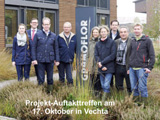
-
[27.10.2014] From january 2015 on, the working groups Hydrology and Ecosystem Research from ILÖK together with the project partners Gramoflor and Stiftung Lebensraum Moor can conduct their research on the establishment of hummock peat mosses in rewetted cutover bogs with financial support from Deutsche Bundesstiftung Umwelt (DBU).
more about the project
DAAD supports research of the WWU Hydrology Group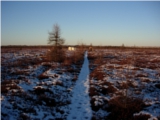
[26.11.2013] The German Academic Exchange service supports a research cooperation of the Hydrology Group (Christian Blodau) with scientists from McGill University in Canada for a duration of two years. The funding supports investigations regarding the interaction between hydrologic change and ecosystem processes in northern peatlands. The research aims at identifying long-term ecosystem level controls on trace gas emissions at Canadian field sites and will characterize coupled ecosystem and biogeochemical dynamics using the recently developed PEATBOG simulation model. Youtube...
CANDYbog - Carbon, water and nutrient dynamics in vascular plant- vs. Sphagnum-dominated bog ecosystems in southern Patagonia - Science at the end of the world
 [07.10.2013] The German Research Foundation will fund a 3-year joint on south hemispheric peat bog ecosystems in Tierra del Fuego. The partners are the Working Groups Ecosystem Research (Till Kleinebecker) and Hydrology (Christian Blodau) of the Institute of Landscape Ecology and the Research Group Regional Hydrology (Lars Kutzbach) of Hamburg University. In the interdisciplinary project we will focus on carbon, water and nutrient dynamics of vascular plant- vs. Sphagnum-dominated bogs. In order to do this, we will utilize a broad range of approaches and methods which include gas flux measurements, peat core dating and measurements of the photosynthetic activity as well as field and laboratory experiments. Project Homepage.
[07.10.2013] The German Research Foundation will fund a 3-year joint on south hemispheric peat bog ecosystems in Tierra del Fuego. The partners are the Working Groups Ecosystem Research (Till Kleinebecker) and Hydrology (Christian Blodau) of the Institute of Landscape Ecology and the Research Group Regional Hydrology (Lars Kutzbach) of Hamburg University. In the interdisciplinary project we will focus on carbon, water and nutrient dynamics of vascular plant- vs. Sphagnum-dominated bogs. In order to do this, we will utilize a broad range of approaches and methods which include gas flux measurements, peat core dating and measurements of the photosynthetic activity as well as field and laboratory experiments. Project Homepage.
Impact of long-term hydrologic change on carbon sequestration and methane release in northern peatlands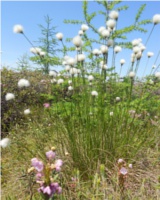
[02.05.2013] The German Science Foundation supports a research project of the Hydrology Group (Christian Blodau) for a duration of three years. Climate models predict substantially wetter winters and drier summers in wide areas of the northern temperate and boreal zone, entailing a stronger hydrologic dynamics in peatlands. As a consequence changes in vegetation communities, water and carbon cycle are expected and may cause a positive feedback on climate change. In the project we will investigate a peatland in Ontario that has undergone 60-year wetting by establishment of a reservoir and study the effects of a winter-wetter and summer-drier climatic scenario. The carbon cycle will be quantified and the controls on the gas exchange be identified using a range of techniques including stable isotope analyses. We plan to use the acquired knowledge to further develop a simulation model of coupled water and carbon cycling in peatlands (PEATBOG).
Regulation of carbon sequestration and methane release in peat soils
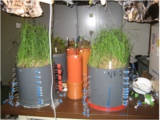 [08.01.2013] The German Science Foundation supports a research project of the Hydrology Group (Christian Blodau) for a duration of three years. Within the project, which covers both hydrological and biogeochemical aspects, it will be tested to what extent gas and water transport control the mineralisation of organic substance and the release of methane from peat soils. The relation will be causally and mechanistically analyzed using both stable isotope and thermodynamic approaches. It is planned to use the acquired knowledge to further develop simulation models of coupled water and carbon cycling in peatlands.
[08.01.2013] The German Science Foundation supports a research project of the Hydrology Group (Christian Blodau) for a duration of three years. Within the project, which covers both hydrological and biogeochemical aspects, it will be tested to what extent gas and water transport control the mineralisation of organic substance and the release of methane from peat soils. The relation will be causally and mechanistically analyzed using both stable isotope and thermodynamic approaches. It is planned to use the acquired knowledge to further develop simulation models of coupled water and carbon cycling in peatlands.



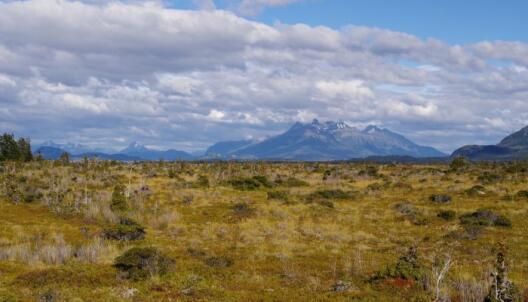


 [07.10.2013] The German Research Foundation will fund a 3-year joint on south hemispheric peat bog ecosystems in Tierra del Fuego. The partners are the Working Groups Ecosystem Research (
[07.10.2013] The German Research Foundation will fund a 3-year joint on south hemispheric peat bog ecosystems in Tierra del Fuego. The partners are the Working Groups Ecosystem Research (
 [08.01.2013] The German Science Foundation supports a research project of the Hydrology Group (
[08.01.2013] The German Science Foundation supports a research project of the Hydrology Group (